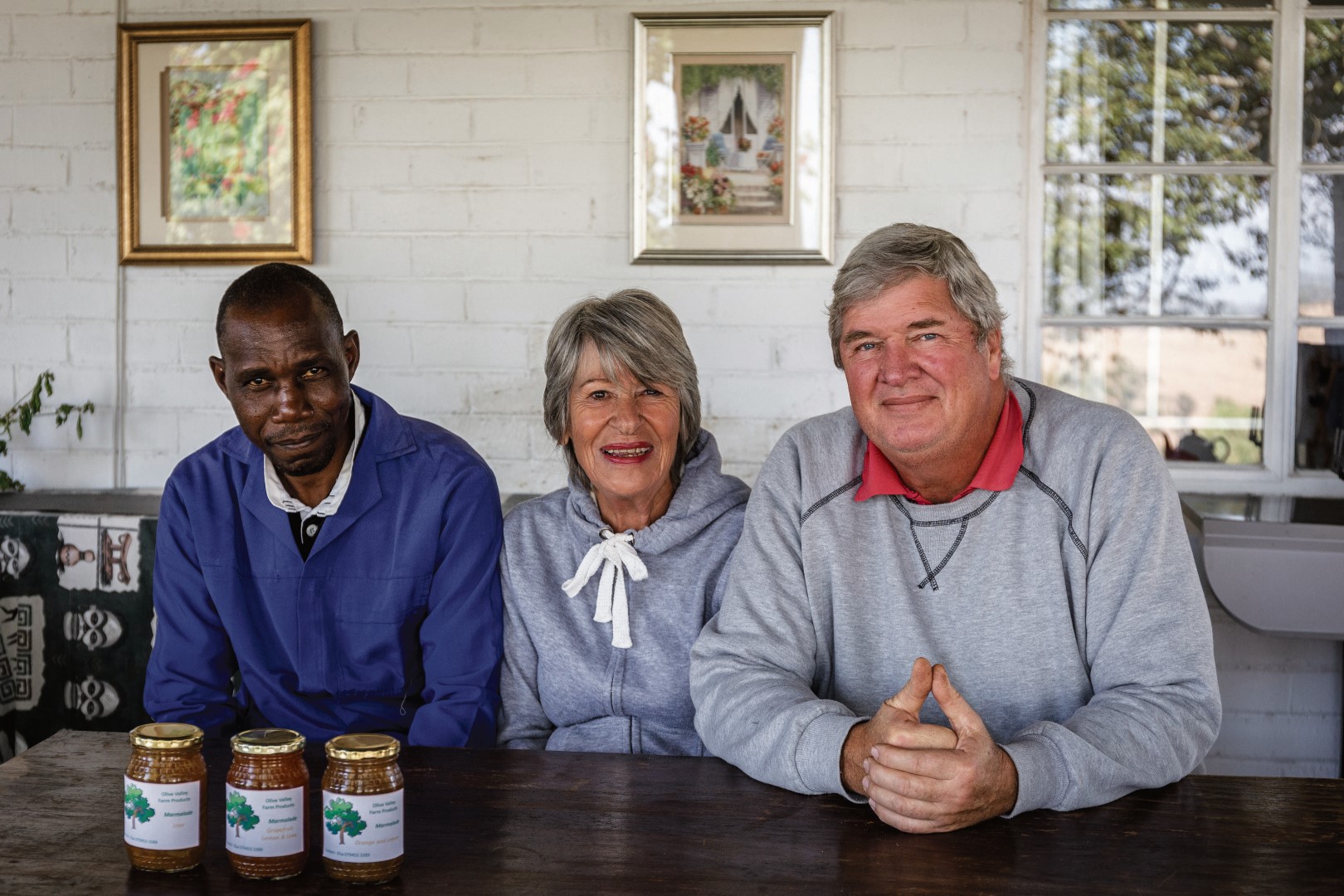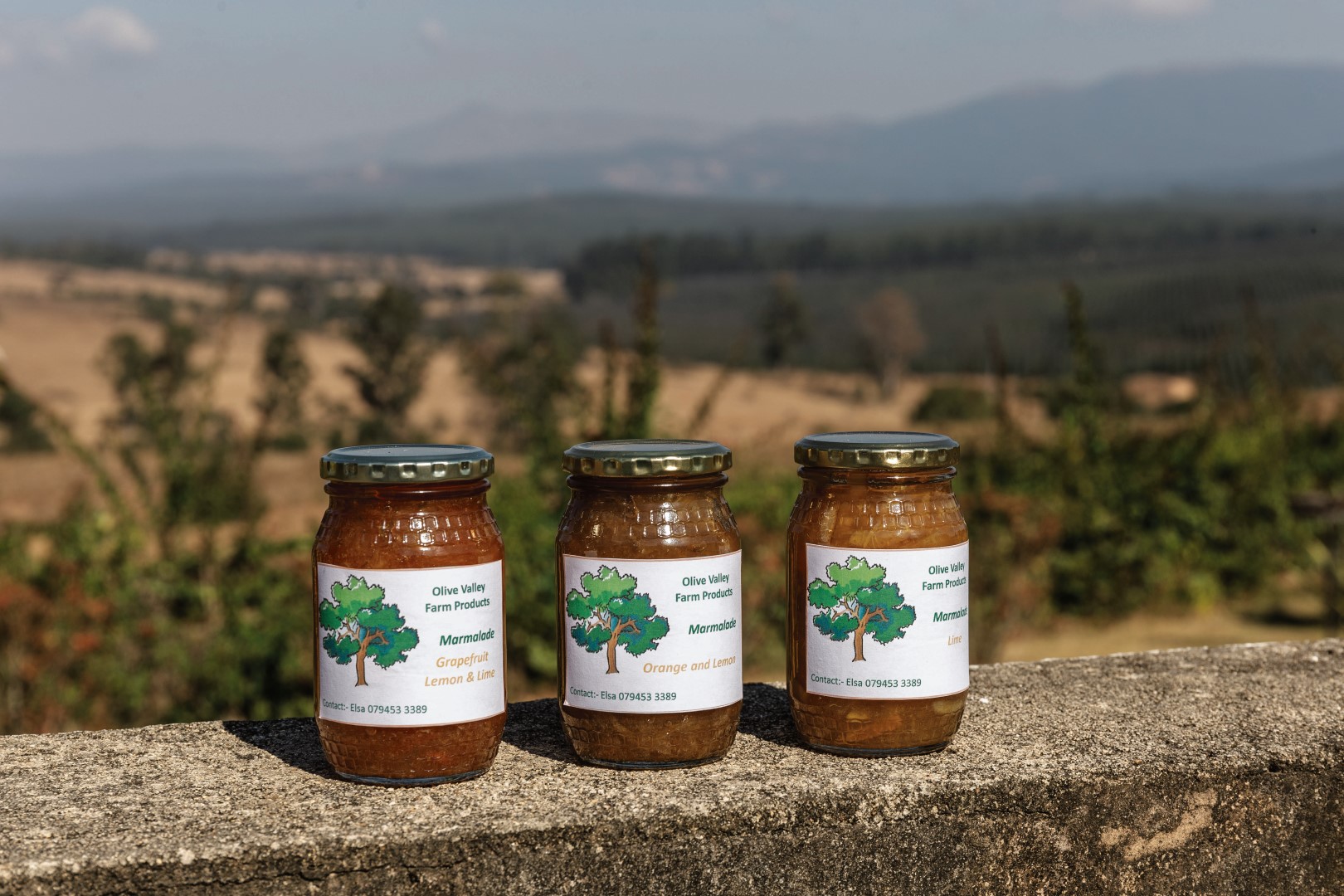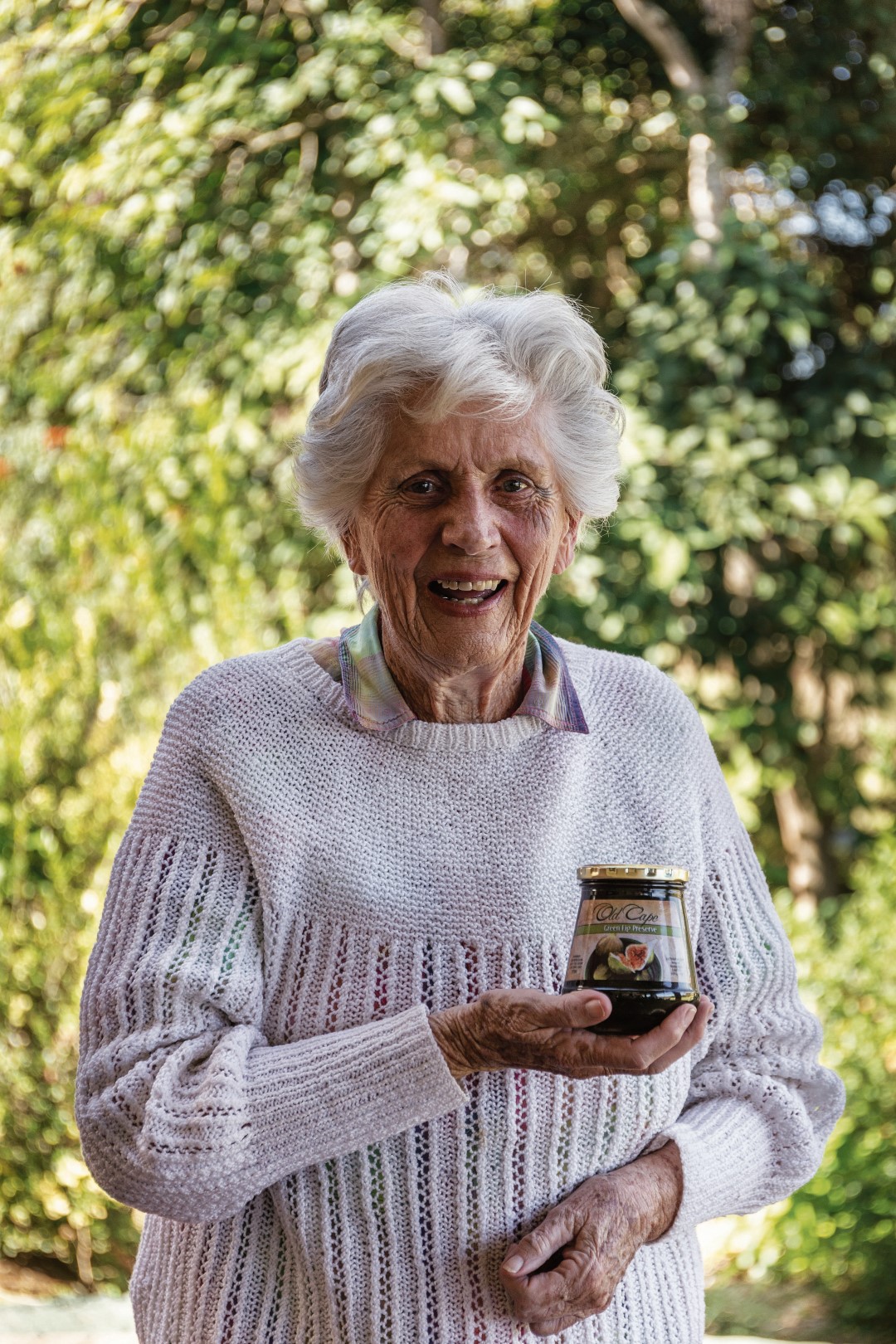It is most commonly known as a thick spread enjoyed on toast or scones, but you haven’t had proper jam until you’ve tried a home-made batch cooked with love, care and years of experience. Get It chats to three of the Lowveld’s jam fundis to find out their secrets and how to get the most out of this sweet, sticky preserve.
There is an Afrikaans idiom that says, “so ‘n bek moet jêm kry”. It translates to “a mouth like that should get jam”, but the English saying “give that man a Bells” describes it more accurately. It is used in situations when you agree with someone; a type of reward (sweet or alcoholic) for like-mindedness.

Peta King-De Wet
Jam and whisky might not seem like a good comparison, but for the preserve connoisseur, Peta King-De Wet, it most certainly is. Peta makes jams, marmalades, sauces and syrups under the brand Blue Pomegranate, and one of her more popular creations is a three-citrus marmalade with whisky. “My dad passed away 10 years ago. He loved my home-made marmalade as well as J&B. I thought I would play around with the combo as an ode to him.”
Peta has been making jam commercially for a year on their farm outside Mbombela, but her experience stretches back more than 10 years. Her dream has been to own a little deli called the Blue Pomegranate. When she closed her events business it was time to bite the bullet. “I think jam-making is in my DNA. My mom couldn’t cook to save her life, but my father was a chef and I grew up in a hotel,” she recalls.
Food wasn’t a burning ambition at first. “But one day I bought a marmalade. It tasted like a jelly with an artificial flavour, and I thought… I want the real deal,” Peta grins. She hauled out one of her dad’s cookbooks and quickly realised she had talent. “I imagine what something should taste like and then I cook it.”
Peta makes a wide variety of products and is expanding every day. “I have from hot and spicy to sweet and sexy; and everything in-between,” she laughs. The Blue Pomegranate range consists of two marmalades, both made with three citruses, and whisky is added to the one. She makes a blueberry jam and syrup, candied stemmed ginger, chutney, sweet chilli sauce (which started off as a tomato and chilli jam), a condensed milk-based mustard, a wholegrain mustard and sriracha sauce (she calls her chilli and garlic creation “ceracha”).
“My jams always change, because I keep it seasonal. I also try to source everything locally.” Peta doesn’t dilute her products with water and she plays around with the jams’ flavours. “I made a pawpaw and pineapple jam which sold out at a recent market. The one lady walked away with my sample jar,” she laughs.

She has also made a roasted peach and vanilla jam, which one customer describes as “pudding in a jar”, but 56 medium-sized peaches only produce four little bottles. “It isn’t necessarily a money-spinner,” she admits. The same goes for her pineapple jam; six queen pineapples produce three bottles. “We are actually in the process of growing our own produce. We have all this space here on our farm.”
The secret to Peta’s treats are in the ratios, otherwise the jams won’t set. “You also have to make sure your fruit is fresh.” She doesn’t add pectin to her jams or marmalades and says if the fruit is in season, the naturally occurring pectin will thicken the product. “I’ve experienced this with blueberries. If I buy them out of season, it just won’t set.”
Most of Peta’s jams and marmalades average at R50 a bottle and she sells them at markets, relies on word of mouth and secures orders thanks to the contact details on her jars. She enjoys markets so much, she decided to start her own – The Market at Runway Zero4 – hosted at the Nelspruit Airfield on the Kaapsehoop Road. “We have an excess of 60 local traders. I’m on a mission to promote what is available in the Lowveld!”
“We have forgotten how to savour the moment. We sit down and scoff our dinner. But you have to taste your food. It is all about the flavour.”
Details
Peta King-De Wet on 082-331-0712
Elsa and Graeme Swart from Olive Valley Farm Products recall the jam they were given at boarding school in Zimbabwe; those bulk cans of mixed fruit with an artificial red colour. They both shudder at the thought.
There is simply no comparison when tasting Elsa’s three different marmalades: lime; orange and lemon; as well as grapefruit, lemon and lime. She also makes atchar, a chilli sauce and macadamia rusks from the macs grown on their farm in the De Kaap Valley.
Elsa makes the jams and rusks with her right-hand man, William Chimanyu, and her husband, Graeme, assists with marketing. “When my family lived in Zimbabwe, they baked and made loads of jams. My mom did it for a living,” Elsa explains. They have known William since they moved to Botswana in 2000, as he worked for friends and relatives.

William Chimanyu with Elsa and Graeme Swart
He also works as a caretaker for Graeme’s 86-year-old father, a job he excels at due to his extreme patience and kindness. “On top of that, he saves me from having to cut up the fruit for the marmalade,” Graeme jokes.
All the citrus used for the marmalades is grown in the De Kaap Valley. “I don’t add preservatives, because it is home-made and healthier. I also do small quantities at a time; I think it’s about the love of using the fruit more so than making a profit,” Elsa says.
They have been making jam on the farm for the past two to three years. She doesn’t sell her chili sauce and atchar, but her marmalades go for R30 a bottle.
“The kind of fruit you use is very important. It can’t be overripe and/or too green,” Elsa elaborates.
The fruit has to be perfect for the pectin to work its magic. “Marmalade is completely underrated. Don’t just think of it as something for toast,” she advises her customers.
“You can use it in your cooking as well – marmalade chicken is delicious!” Elsa suggests it in pork dishes, as well as with bread and butter pudding.
Olive Valley Farm Products are mostly sold at the markets held in Kaapsehoop, and the team relies on word of mouth. You can find smaller jars of the lime preserve stocked at the shop and restaurant Miz Gooz Berry, also in Kaapsehoop.

“We find it very difficult to supply to big chain stores. We were growing vegetables to sell as well, but they prefer to get stock from supply chains,” Graeme explains.
He adds that he finds selling at markets tough, because you might have to interact with a client who thinks your product is too bitter.
“It can be difficult and disheartening when you’re not pleasing everyone,” he elaborates. Graeme has now learnt to accept that people’s tastes differ. “I’m old school. I like something bitter, opposed to a strawberry and apricot jam which is sweet.”
Details
Elsa Swart on 079-453-3389
Helen Maddison on the other hand prefers the sweet stuff; she makes fig preserve, raspberry jam and lemon curd for her brand Old Cape. “I’ve made fig preserve for my family for more than 50 years,” she recalls.
“When we moved to our farm in Waterval Onder in 1988, my son told me that I make the best fig preserve and I should open a fig factory,” Helen explains. Unfortunately her son passed away at the age of 36.

Helen Maddison
“I decided that in memory of him, I should finally open that factory.” She raided her sisters’ trees for cuttings and planted figs on the farm. “Our surname is Maddison – with two ds – doubly mad we always say. We lived in the madhouse and we called the farm Around The Bend,” she shares smiling. Today the property is known as Zongororo Guest Farm.
“That is where I started planting the figs and later we moved with the trees. Luckily the plants are pretty hardy; some of them died, but most survived. Now we have a farmer in the Schoemanskloof Valley who has 350 trees. We gave him our plants for next to nothing and we buy the whole crop from him.”
Helen has been making Old Cape products for the past four to five years and enjoys the process, but it is crucial for her to make a profit. She and her husband don’t have a huge pension, or a medical aid.
“I’ve learnt how to make raspberry jam by visiting my mother-in-law who lived in England.” She recalls annual trips in the ‘90s; they visited farms where you can pick your own raspberries and strawberries. “I interrogated all the farmers to find out who grew the best fruit. I asked them what they did and how they did it.”
Helen made about 100 bottles of jam, which her mother-in-law gave away to friends throughout the year. She would make 12 bottles for herself, place them in her luggage and bring them back home.
She started looking for fruit here in South Africa. “A friend of mine had a nursery and she had raspberries which were acclimatised to this area,” she explains. “To grow figs and raspberries around Mbombela is not a done thing. But nobody told me that, so I just did it,” she laughs.

Her secret to a great jam is the quality of the fruit. “And, don’t overcook it. I cook my raspberry jam for five minutes, then you still have that fresh taste,” she adds. “All the recipe books say boil it for 20 minutes… but that means bye-bye flavour!”
The Old Cape fig preserve is stocked at Steiltes and The Grove SPARs, and Crossing SPAR sells the fig preserve as well as the raspberry jam. “We used to sell at the market in Kaapsehoop. It costs R50 for the jam or lemon curd, and R70 for the preserve.” Customers have urged her to export her figs. They rave about the fact that it simply is the best they have ever tasted.
“Our customers have told us wonderful things about our products. Have you ever tried a toasted cheese sandwich with fig preserve?” Another customer does a roasted fillet with blue cheese or Camembert and adds the figs on top. It is also lovely with pork chops.
Helen says many people don’t know much about lemon curd. “Some mix it with vanilla ice cream. Someone else adds it to cream for a pavlova,” she explains. “Another customer – a rugby fanatic – says no man, you just sommer take a spoon and eat it while watching sport,” she laughs.
One thing is evident… curds, jams and marmalade belong on a whole lot more than just your morning toast.
Details
Helen Maddison on 072-212-2605
Text and photographer: MIA LOUW






